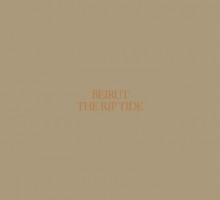
Beirut
The Rip Tide
(Pompeii; 2011)
By Kaylen Hann | 19 August 2011
The elements of exposure have been against Beirut. Six years of not being able to walk into secondhand bookshops and shitty-sofa’d coffeeshops without hearing “After the Curtain” from Gulag Orkestar (2006) and the like has taken its toll—as it would take a toll on any album. While follow-up albums Flying Cup Club (2007) and the March of the Zapotec/Holland EP (2009) each took their rightful victory laps on my iTunes before bidding their adieu, long-term “infatuation-albums” is where Gulag Orkestar is squarely and securely cataloged for me. However, boxed and categorized as such, even The Rip Tide, this beautiful little album with its weighted horns, wintry marches, and longing plights of vocals, has been, shall we say, peppered with years’ worth of layers of disinfatuation-dust, a thick silt composed of shrugs, and enough callusing to emit a completely undeserved auto-hesitation at the suggestion of a new album. One can almost smell the coffee ready to brew along with this shit.
Far be it for me to say I’d ever tire of Zach Condon, the cherub-faced, wobbly trumpeter and mad strummer of heartstrings and ukulele alike. Honestly, as he belts out his age-defyingly august and lady-parts-melter of a voice, he’s as close as this girl’s got to an indie-Bieber. Just like with the Bieb, there’s an oddly similar duality at play between Condon’s frumpy, red-faced average-boy-ness and the unknowability that escalates to the practically mythical when Condon opens his mouth. And just like with the Bieb, it’s as if Condon’s got a bellows plugged right into my main artery, poofing my heart up with every breath. Whatever he’s selling, whatever instrument’s in his hands when he’s selling it: it’s unerringly pervasive, infectious. The ensemble of instruments used for light or dark, those buoyant strums or wavering wheezes and soars of Eastern European elements are equal parts used to break and ameliorate the ol’ ticker.
It takes a new album, perhaps, not to extend their catalog and presence, but to prove how simple and affective Beirut’s sounds are and always were, even when this majestic Bieber-like figure and his shlumpy, come-and-go band-mates are as loosely tied to one another as snot particles in a blown-out sneeze. The first realization in the earliest moments of opening ballad “A Candle’s Fire” is: Beirut doesn’t really need an invitation; Condon’s is the kind of voice I want to be hearing when I hear a song, any capital-“S” Song, and the band crafts the kinds of Songs that automatically throw open doors to my enjoying them. They are immediate escapades; they are deportations; they are twilight vignettes in ruins, Secret Gardens tucked away in woozy blurts of brass and waltzing strings. Theirs is the sound of escapism, but escapism that doesn’t take you anywhere except some tenderly internalized, sequestered notch in yourself.
Through the most austere of trudging-onwards tracks, to the most pathos-inducing ballads of “Postcards from Italy,” to Pallett’s lover’s plea “Cliquot,” Beirut’s songs are always narrations pregnant with urgency and desire, even if all that desire sounds like is exhaustion. And however theatrically ornate, however heavy of heart, Condon’s lyrics have always bounded past the music, his voice tugging at the bit, leaping ahead of each song’s pace in a tormented struggle fueled by one longing or another. Maybe one of the definitive differences between previous works and The Rip Tide is the way Condon sounds more in-step, more steeped in his own music: engaged in an interlude or dance with the music around him instead of jumping over it so strenuously. The brass instrumentation, for instance, has moved away from world-weary, wilting violets and has taken on a Southwestern heat and celebratory blare. Even the real Fiona Apple-esque pulmonary-pounder “Goshen” picks up with brisk snares tattering the tune’s simplicity.
Condon’s relaxed into this album, even gladly exchanged Flying Cup Club‘s fussiness for fustiness and a moth-eaten record static that infects the entirety of the tracks, from the distorted dust-mote quality of synths in “Santa Fe” to the little pops of spittle crackling in the corners of Condon’s cheeks as he’s singing a mantra-like ending to “The Peacock.” While Beirut’s discography has sounded like the fleshing out of a band that would be found only otherwise in a ghostly form emanating from a crackly gramophone, The Rip Tide has taken up more of this actual record aesthetic for itself—consciously or not.
Track after track, lyrics like “This day undone, but can it bring some good,” or “Whatever comes through the door,” or “If you have to go, would you carry on my way” implement visions of hands-in-the-air submissions and unusually opened-armed gestures of letting go. And perhaps this letting go is the sunniest disposition The Rip Tide has to offer. Instead of Condon as the source of the record’s epic pull and current, he’s reined in his penchant for grasping and grappling and seems to be content to rest on the shore, letting the pull of other things carry away what they will, sometimes with a eulogy, sometimes with smiling trumpets. It’s a great accomplishment from a songwriter for which we should expect exactly as much.





